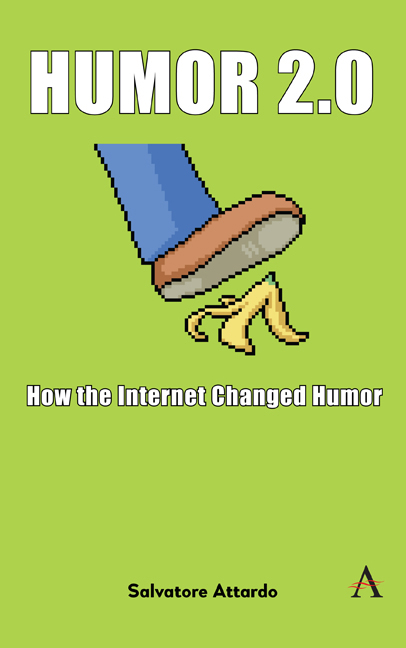4 - The New Language of Humor
Published online by Cambridge University Press: 28 February 2024
Summary
In this chapter we will consider some “properly linguistic” topics. How much has the English language changed in the 20 years of the era of the internet? Spoiler alert: not much.
Does OMG Spell Trouble for the English Language?
McWorther (2013) notes, “We always hear that texting is a scourge. The idea is that texting spells the decline and fall of any kind of serious literacy, or at least writing ability, among young people in the United States and now the whole world today.” McWorther goes on to debunk this, as does McCulloch (2019). Indeed, Baron (2004) and Tagliamonte and Denis (2008) show that an extremely small percentage of text in IM actually consists of internet slang, such as OMG, TTYL, or LOL. Baron (2004, p. 416) concludes that “the use of CMC abbreviations and CMC acronyms was minimal” in fact in some cases less than 1 percent of the data. Tagliamonte and Denis (2008 ), using a much larger corpus, report a comparable figure of 2.4 percent. In short, the reports of a “breakdown in the English Language,” “bastardization” and “linguistic ruin” (quoted in Tagliamonte & Denis, 2008, p. 4) are merely the current expression of the old alarmism used to stigmatize language change since the birth of prescriptivism, in the 18th century. Swift writes in 1710 about “the corruption of the English tongue.” Lowth's grammar is published in 1762; Murray's in 1795. Of course there was nothing wrong with the English language in 1710, much like there's nothing wrong with it in 2020. The fundamental problem with prescriptivism is that it's not a scientific approach. It is based on prejudice and misconceptions. Linguistic change, the invention of new expressions and the progressive adjustment of forms and meanings to reflect new realities that the speakers of the language want to talk about, is not only normal, but what makes a language a live one. The only languages that do not change are the dead ones. So, the fact that a negligible percentage of IM speech consist of new acronyms or other expressions is not a problem; it is a sign that the language is lively. We will return to some of these expressions, most notably LOL.
Internet Slang
Let's start by defining the much misused term “slang.” Slang is a term for a variety used by a restricted part of the population, often with a low status (students, criminals).
- Type
- Chapter
- Information
- Humor 2.0How the Internet Changed Humor, pp. 51 - 62Publisher: Anthem PressPrint publication year: 2023

